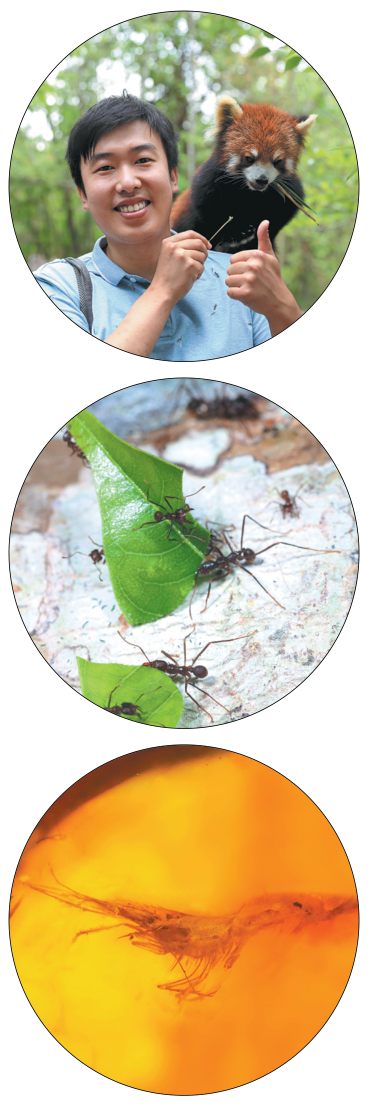More than a mere interest in insects
A researcher's unique outlook has enabled him to explore the world of bugs from a new perspective and share their 'superpowers' with the rest of us, Wang Ru reports.

Nature was Chen Rui's "childhood home". The 37-year-old researcher at the Chinese Academy of Sciences' Institute of Zoology was not able to talk until he was 4 years old because of the way his brain processes sensory information.
This made him "strange" in some people's minds. So, he didn't have friends who were around his age.
This led him to turn his attention to nonhuman things around him. He became enraptured by the world of insects.
"The happiest time of my childhood was in the farm fields," says Chen. "I squatted there, observing the activities of insects, including ants building their homes, grasshoppers nibbling grass and dragonflies flying low. I had so many questions about their activities and was full of curiosity about this world."
These experiences planted a seed in his heart. Decades later, he's a scholar who has engaged in life-science investigations in nearly 100 countries and regions on five continents.
He has found around 100 new species, living and extinct, many of which are named after him.
"I was a child who was 'cured' by nature," he says. "I wanted to grow up to share the power of nature with more young people and to popularize understanding of animals, including insects. I wanted to start classes to bring children to learn in the open air and experience the gifts nature endows."
These aspirations led him to recently publish the popular-science book, Du Chong Ji (Reading About Insects).
It's a continuation of a mission he began to act upon as a freshman in 2006, when he started an association for people interested in insects at Nanjing Agricultural University. He often arranged for members to visit the Zijin Mountain in Nanjing, Jiangsu province, to look for bugs. His organization eventually had nearly 600 members.
After graduating in 2010, Chen was admitted to the University of Chinese Academy of Sciences to complete his doctorate in zoology. In 2016, he was recruited by the Institute of Zoology of the CAS.
He now focuses on animal evolution.
"Evolution is the source of civilization. It gives all living beings the superpowers they need to live on Earth," says Chen.
He has visited the Amazon rainforest several times.
"Chinese scientists hadn't been there often, and we didn't really understand the place. So, we are traveling there to try to discover new species, and to collect more data and information," says Chen.
Amazon ants
One impressive insect variety he observed in the tropical, biodiverse area were leaf-cutter ants, a species that shows impressive cooperation and farming abilities.
He explains that the ants tear leaves into small, easily movable pieces and carry them back to their colonies to fertilize mushrooms that they, in turn, eat.
Chen spent three days observing one nest in the Amazon several years ago and was amazed by their close coordination.
He observed that the ants are divided into different groups that are respectively responsible for cutting leaves, transporting harvested pieces, clearing obstacles out of the way, guarding the colony, taking care of the young and planting mushrooms.
"Several million ants can live in one nest, but their activities are very orderly," says Chen.
To ensure the freshness of the harvested foliage, leaf-cutter ants often find the shortest routes from the source to their nests. When they move leaves from different places to their nests, it seems in some ways similar to human logistical systems, Chen says.
He points out that ants planted mushrooms tens of millions of years before humans did, creating one of the oldest agricultural systems on the planet.
And Chen also points out that leaf-cutter ants are not the only species to possess "magical" abilities. All insects have such "superpowers", he says.
"Half of the world's living beings are insects," says Chen.
"Humans only have an evolutionary history of 6 million years, but insects have been around several hundred million years, which means they experienced competition for incredibly long periods but haven't been eliminated.
"Insects were the earliest creatures that could fly and feed themselves by farming. They have survived three mass extinctions. No other living things can claim such great achievements."
He hopes that people will learn and take inspiration from insect "superpowers" and apply it to their own lives.
"If we humans believe we are the smartest beings in the world, we may be constrained by this preconception. If we are instead humble and regard all other beings as our teachers, we can gain boundless wisdom," Chen says.
"We should actually see ourselves as equals with other species and believe this is a great world."
This belief has also led Chen to upload over 350 videos about animals, which have gained over 350,000 followers on the short-video platform, Douyin.
He has also taken youngsters to observe insects in the wild.
"Actually, insects are the best playmates for young people. For example, we get them to think about how mosquitoes can stand upside down on the ceiling and why humans can't," Chen says.
"They discover the charm of nature and scientific knowledge from such observations, and find new curiosity about this world."
Beijing primary school student Wang Ruocan participated in a camp Chen organized in the Xinjiang Uygur autonomous region in 2021.
"It was a marvelous journey during which I learned a lot of new things about insects," she says.
Frozen in time
Time is another important metric for evolution. This has prompted Chen to collect amber, which often contains samples of life forms from ancient eras.
One of his prized pieces is a 22 million-year-old chunk that contains a shrimp, which he bought in Mexico around 2016.
"At first, it looked like it was just a black stone, but after I polished it, the amber appeared. I felt like I'd just won a 100 million yuan ($13.9 million) lottery prize," Chen recalls.
It's the only amber specimen to be discovered with a real shrimp and heralds the finding of a previously unknown species.
Chen and his colleagues published the results of their research about the piece of amber in the academic journal, Science Bulletin, in 2021.
It is particularly precious since the shrimp had to be out of the water and somehow end up trapped in resin in order to be preserved in the amber, which is a very rare scenario, Chen says.
He has collected a lot of amber and put it on display in an insect museum in his hometown of Sanming, Fujian province.
"Amber is like a time capsule left by nature, and offers the only three-dimensional historical images of many ancient insects. It solidifies moments that have occurred on Earth. Through them, we can catch a glimpse of what has happened on this planet," says Chen.
"This is particularly fascinating."


Today's Top News
- Chengdu games hailed as the new benchmark
- Xi, Lula pledge to deepen China-Brazil cooperation
- China, US reach deal to extend tariff suspension
- Demand for?Nvidia’s H20 chip lackluster
- Washington not incarnation of justice: China Daily editorial
- Tariff truce gains time for talks although some tough issues remain to be resolved





























